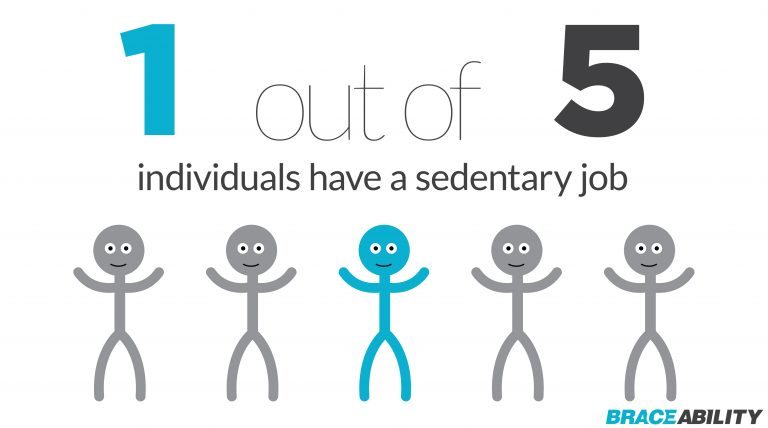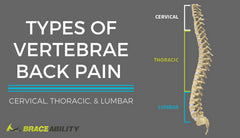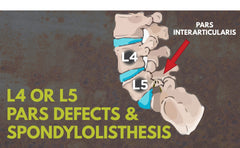Do You Find Yourself Sitting All Day at Work? Your Sedentary Job Has Many Negative Health Effects
Stop what you’re doing and look at how you’re sitting. Are you hunched over forward with your head only just inches away from the monitor? Or are you laid back with your feet stretched out in front of you and your arms struggling to reach the keyboard? Sitting with good posture can be extremely challenging especially if you’re in the same spot for eight hours of your day.
 Sedentary jobs are defined as a minimum amount of walking or standing is necessary to carry out your day-to-day tasks, ultimately leading you confined to a seated position for a majority of your day. Such jobs vary from technology jobs, office jobs, transportation jobs, etc. With technology constantly changing, computers or machines now replace jobs that once required physical labor. Sedentary jobs lead to a lifestyle of many risks that once weren’t as prevalent including poor posture.
Sedentary jobs are defined as a minimum amount of walking or standing is necessary to carry out your day-to-day tasks, ultimately leading you confined to a seated position for a majority of your day. Such jobs vary from technology jobs, office jobs, transportation jobs, etc. With technology constantly changing, computers or machines now replace jobs that once required physical labor. Sedentary jobs lead to a lifestyle of many risks that once weren’t as prevalent including poor posture.
While we all know proper posture makes you look better, did you know it can help you feel better too? There are multiple benefits of having good posture including alleviating chronic neck and back pain, reducing stress and tension in your neck, giving you more energy and even more confidence. Correcting your posture isn’t just for when you’re sitting, the way you sit can affect your walking and standing posture as well.
Our bodies are made to stand and move, but instead, we tend to sit or lay down for a majority of our day. While sitting, we alter the way our spine naturally curves; in turn, straining your back muscles in hopes to hold your shape. Having poor posture while sitting has many negative health effects and has become an increasingly large problem in our society.
Negative health effects of poor posture while sitting:
- Depression and stress: When we slouch in a seated position for an extended amount of time, our internal processes slow down resulting in a decrease in energy and oxygen levels. Our bodies may become irritated or aggravated because our muscles and organs have to work harder to circulate oxygen.
- Poor digestion: Poor posture compresses your digestive organs, resulting in them not functioning properly. This not only affects your organs, but your metabolism, and the way your body processes food as well./li>
- Cardiovascular issues: Sitting with poor posture increases your chance of cardiovascular problems such as a heart attack.
- Back pain: Whether it’s lower, middle, or upper back pain, poor posture can result in stress and strain in numerous parts of your back leading to chronic pain.
- Abnormal spinal curve: Although your spine has a natural curve, poor posture can result in postural kyphosis and other spine curvature disorders.
- Sore or tense muscles: While slouching, your muscles have to work hard to overcompensate for your slouching or hunching position. Your muscles can become sore or tired from the extra work.
- Headaches: Sitting in a poor posture position can cause nerve irritations and muscles spasms, resulting in tension headaches.
Changing your occupation to one that isn’t as sedentary isn’t the most realistic and may not be possible. Luckily for you, you can change your sitting position at your desk to help correct your posture! You can also wear a posture corrector while sitting at your desk to help train and remind your muscles to sit up straight.
 The more you sit in the same position, the more likely you are to develop different health problems. Changing the way you are seated at your job can help alleviate posture problems, but there can be other health problems from a sedentary job aside from poor posture.
The more you sit in the same position, the more likely you are to develop different health problems. Changing the way you are seated at your job can help alleviate posture problems, but there can be other health problems from a sedentary job aside from poor posture.
Other health problems caused by sedentary jobs:
- Mental problems: Stress, anxiety, exhaustion, reduced social skills, and depression
- Eye problems: Dry eyes, eye strain, temporary blurred vision, headaches, and migraines
- Heart problems: High blood pressure, cardiovascular disease, stroke, and heart attack
- Limb problems: Loss of muscle and flexibility, carpal tunnel syndrome, and hand or wrist tendonitis, varicose veins, and misaligned hips
- Back problems: Ruptured discs, pulled or strained muscles or ligaments
- Stomach problems: Weight gain, metabolic syndrome, slower metabolism, and diabetes (type 2)

- Use stairs instead of the elevator!
- Ditch your car! If your office or work is close by, try walking or biking to work one day.
- Drink more water. You will not only be forced to get up out of your chair to go to the bathroom, but you will be hydrated as well.
- Eat lunch away from your desk. Pick a place to enjoy your lunch outside or away from the office to give yourself a break.
- Take a walk at the end of your day. Even though the couch may be extremely tempting, take a walk around the block to help stretch out your muscles after sitting all day.
- Vary your different tasks throughout the day, change it up!
- Next time you want to email your coworker who is down the hall, try taking a walk and talk to them in person every once in awhile.




